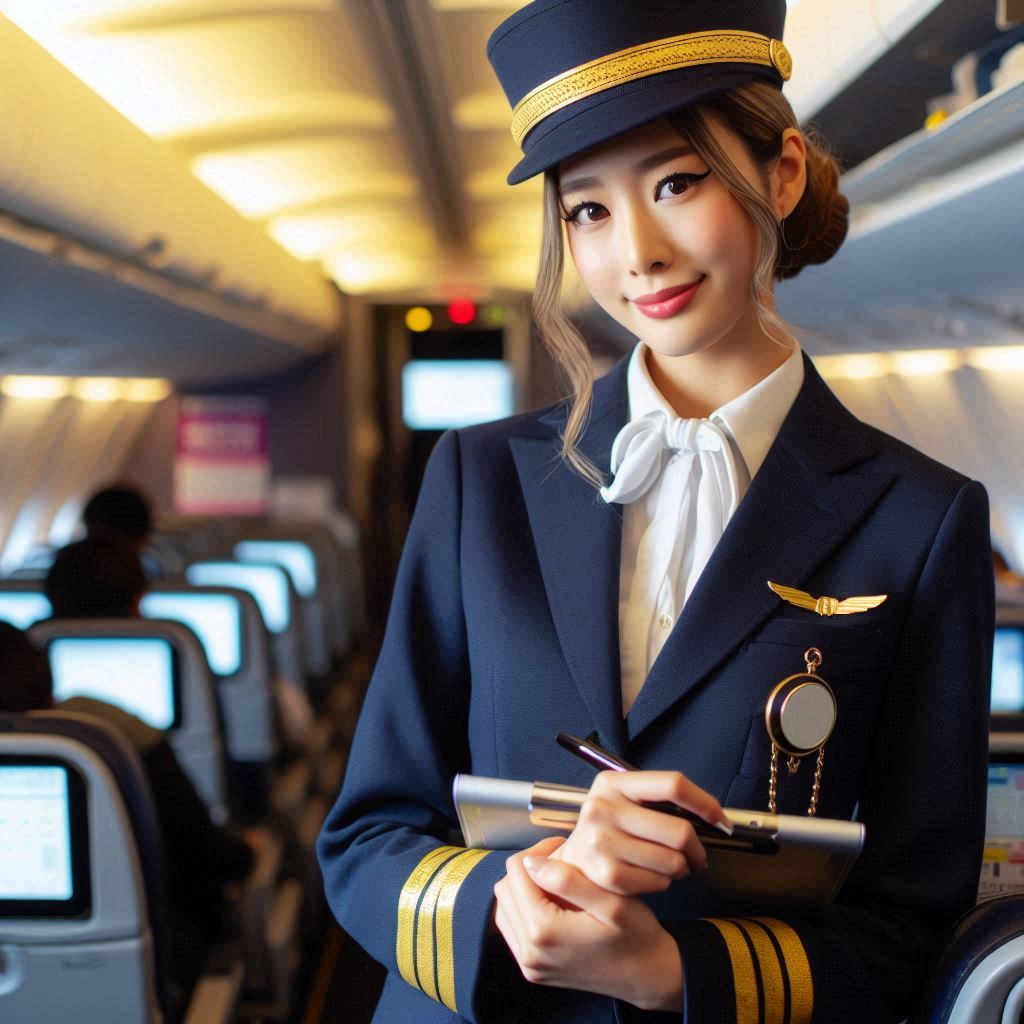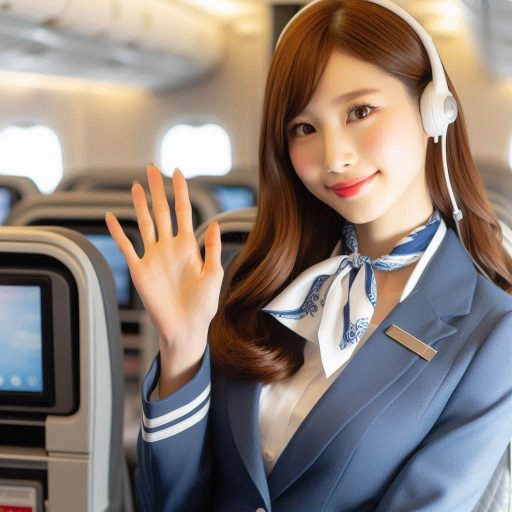Introduction
Flight attendants play a crucial role in the airline industry.
They ensure passenger safety and comfort throughout the journey.
Their responsibilities extend beyond serving meals and drinks.
Flight attendants manage emergencies, assist passengers, and create a welcoming atmosphere.
Hearing real-life experiences from flight attendants provides valuable insights into their world.
These stories reveal the challenges and rewards of the job.
They also highlight the dedication and professionalism required in this role.
Each flight attendant has unique experiences that shape their perspective on flying.
In this blog post, we will share several captivating stories from flight attendants.
These stories will include moments of courage, compassion, and teamwork.
You will read about encounters with challenging passengers and unexpected emergencies.
Additionally, we will explore the camaraderie and friendships that develop among crew members.
Through these narratives, you will gain a deeper appreciation for the flight attendant profession.
Their hard work and resilience contribute significantly to passengers‘ travel experiences.
Prepare to be inspired by the incredible stories that illustrate the essence of being a flight attendant.
What It Takes to Become a Flight Attendant
Training and Qualifications Required to Become a Flight Attendant
Becoming a flight attendant requires dedication, training, and specific qualifications.
The journey can be challenging, but it is also rewarding.
Aspiring flight attendants must meet certain educational and physical requirements.
Most airlines require a high school diploma or GED.
However, many prefer candidates with a college degree or relevant experience in hospitality or customer service.
Training programs for flight attendants typically last between four to eight weeks.
These programs cover a wide range of topics, including safety procedures, emergency protocols, and customer service skills.
Flight attendants learn to handle various situations, from medical emergencies to passenger conflicts.
Additionally, trainees receive instruction on the use of emergency equipment and first aid.
Personal Anecdotes from Flight Attendants About Their Journey to Becoming a Flight Attendant
Personal anecdotes from experienced flight attendants reveal the emotional journey of becoming a flight attendant.
One flight attendant shared her excitement about receiving her acceptance letter.
She recalled the overwhelming joy she felt as she embarked on her new career path.
Another attendant mentioned how rigorous training pushed her to grow both personally and professionally.
Unique Skills and Attributes Needed to Excel in This Role
Aspiring flight attendants also need to develop unique skills and attributes.
Strong communication skills are essential for interacting with passengers and crew members.
Flight attendants must remain calm under pressure, especially during emergencies.
Adaptability is crucial, as no two flights are ever the same.
Empathy plays a significant role in providing excellent customer service.
Flight attendants must understand passengers’ needs and respond appropriately.
One attendant shared a touching story about comforting a nervous flyer.
She reassured the passenger and offered extra attention throughout the flight.
Multilingual abilities can give candidates an edge in the competitive job market.
Speaking multiple languages helps flight attendants communicate effectively with diverse passengers.
This skill enhances the travel experience for everyone on board.
Additionally, strong teamwork skills are vital for success in this role.
Flight attendants work closely with pilots and crew members to ensure safety and comfort.
One flight attendant recounted how teamwork helped them handle a challenging situation.
The crew worked together seamlessly to resolve a passenger issue, demonstrating the power of collaboration.
Becoming a flight attendant requires training, dedication, and specific qualifications.
Personal stories highlight the emotional journey and unique challenges involved.
Aspiring flight attendants should focus on developing essential skills like communication, empathy, and teamwork.
By cultivating these attributes, they can excel in this rewarding profession.
Read: Customer Service Tips for Pet Grooming Professionals
Crazy Passenger Encounters
Share Entertaining and Unbelievable Stories of Interactions with Passengers
Flight attendants often encounter entertaining and unbelievable situations with passengers.
These stories reveal the unpredictable nature of working in aviation.
One flight attendant recalled a passenger who insisted on bringing a live iguana on board.
The staff handled the situation with humor, explaining the airline’s pet policy.
Another attendant shared a story about a passenger who mistook the emergency exit for a bathroom.
This created confusion and laughter among the crew and passengers.
Flight attendants quickly intervened, guiding the passenger back to their seat.
These encounters demonstrate the importance of quick thinking and adaptability in the role.
How Flight Attendants Handle Difficult Passengers in a Professional Manner
Handling difficult passengers can be a challenge.
Flight attendants often encounter passengers who are upset, intoxicated, or simply rude.
Maintaining professionalism in these situations is crucial.
One flight attendant explained her strategy for dealing with irate passengers.
She listens carefully, acknowledges their concerns, and offers solutions.
Remaining calm is essential when facing challenging situations.
Passengers often take cues from flight attendants’ reactions.
If attendants stay composed, they can defuse tension on board.
One attendant recounted a situation where a passenger became aggressive over seating arrangements.
She calmly explained the airline’s policy and offered an alternative solution.
Flight attendants often rely on teamwork to manage difficult encounters.
When a situation escalates, they communicate discreetly with their colleagues.
This collaboration helps create a united front in dealing with challenging passengers.
One flight attendant shared how her crew rallied together during a disruptive incident.
Their teamwork ensured the situation remained under control.
Importance of Remaining Calm and Collected in Challenging Situations
Another critical aspect of handling difficult passengers is empathy.
Flight attendants must understand that passengers may experience stress or anxiety during travel.
One attendant described comforting a passenger who had a panic attack.
She sat with them, provided reassurance, and offered breathing techniques to help calm their nerves.
In addition to empathy, humor can diffuse tension effectively.
A light-hearted joke can sometimes shift a passenger‘s mood.
One flight attendant shared how making a playful comment helped ease a tense situation.
Laughter can bridge gaps and create a more positive atmosphere on board.
Flight attendants also undergo training to prepare for difficult encounters.
These training sessions teach conflict resolution strategies and effective communication skills.
They learn how to assess situations quickly and respond appropriately.
Crazy passenger encounters provide entertaining stories and valuable lessons.
Flight attendants handle difficult passengers with professionalism and empathy.
Remaining calm and collected is vital in challenging situations.
By utilizing teamwork, humor, and effective communication, flight attendants create a positive travel experience for all.
Read: Nail Technician Etiquette: Dos and Don‘ts
Traveling the World
Perks of Being a Flight Attendant and Traveling to Various Destinations
Being a flight attendant comes with incredible perks.
One of the biggest advantages is the opportunity to travel the world.
Attendants visit diverse cities and countries, experiencing unique cultures.
This role allows them to explore new destinations regularly, often with minimal expense.
Many airlines offer discounted or free flights for their employees.
This benefit encourages attendants to maximize their travel experiences.
Stories of Memorable Experiences in Different Cities and Countries
Flight attendants often have memorable stories from their travels.
One attendant recalled her layover in Paris.
She enjoyed a leisurely stroll along the Seine River, savoring authentic French pastries.
Another flight attendant shared a hilarious story from her trip to Tokyo.
She accidentally entered a sumo wrestling match, bringing laughter to everyone present.
Many attendants enjoy local cuisine during layovers.
One attendant described dining in a bustling street market in Bangkok.
The vibrant atmosphere and delicious street food made it unforgettable.
These experiences enrich their lives and create lasting memories.
How Flight Attendants Balance Work and Leisure While Traveling
Balancing work and leisure is essential for flight attendants.
They often have limited time to explore new destinations.
However, they learn to maximize their layover time efficiently.
One strategy involves planning activities in advance.
By researching the destination beforehand, they can prioritize must-see attractions.
Flight attendants often travel in groups, enhancing their experiences.
Exploring together creates opportunities for bonding and shared memories.
Group adventures can range from city tours to dining experiences.
These shared moments strengthen camaraderie among colleagues.
Self-care is also crucial for maintaining balance during layovers.
Flight attendants must rest and recharge after long flights.
One attendant emphasized the importance of sleep.
She suggested taking short naps to recover energy before exploring.
This approach helps them enjoy their time off without feeling exhausted.
Managing schedules effectively is another key to balancing work and leisure.
Flight attendants must stay organized to make the most of their layovers.
They often keep track of flight times and layover durations.
This helps them avoid scheduling conflicts and ensures they maximize their free time.
Additionally, flight attendants often form friendships with locals.
These connections can lead to unique experiences.
One attendant shared how a local tour guide took her to hidden gems in Rome.
This personal touch made her visit memorable and enriching.
Being a flight attendant offers incredible travel perks.
Memorable experiences in various cities and countries enhance their lives.
Balancing work and leisure is vital for enjoying travel opportunities.
By planning ahead and embracing local cultures, flight attendants create lasting memories worldwide.
Read: Developing Patience and Precision in Pet Grooming

Unexpected Situations on Board
Stories of Unexpected Events and Emergencies That Flight Attendants Have Encountered
Flight attendants often face unexpected situations during flights.
One attendant recounted a time when a passenger fainted mid-flight.
The crew quickly sprang into action, assessing the situation and providing immediate assistance.
They used oxygen masks and monitored the passenger‘s vital signs.
Thanks to their prompt response, the passenger recovered before landing.
Another attendant shared a story about a sudden turbulence encounter.
The plane jolted unexpectedly, causing items to fly around the cabin.
Passengers panicked, but the crew remained calm and reassured them.
They secured the cabin and ensured everyone was safely buckled in.
This experience highlighted their training and ability to maintain composure under pressure.
Unexpected weather changes can also create challenges.
One flight attendant remembered a storm that developed quickly, forcing an emergency landing.
The crew prepared passengers for landing, explaining the situation clearly.
They provided reassurance and maintained a professional demeanor throughout the ordeal.
How Flight Attendants Are Trained to Handle Safety and Security Incidents
Flight attendants undergo extensive training to handle emergencies effectively.
They complete rigorous courses on safety procedures and emergency protocols.
This training includes simulations of various scenarios they might encounter.
For example, they practice evacuating passengers during emergencies.
These drills prepare them for real-life situations.
Flight attendants also receive training in first aid and CPR.
They learn how to assess injuries and provide immediate care.
This knowledge is vital in situations where medical assistance is required.
Many attendants have successfully used their training to assist injured passengers.
Security training is equally important for flight attendants.
They learn how to identify suspicious behavior and potential threats.
Understanding how to handle conflicts with unruly passengers is also essential.
This training helps them maintain a safe environment on board.
Importance of Quick Thinking and Problem-Solving Skills in Such Situations
Quick thinking and problem-solving skills are crucial for flight attendants.
In unexpected situations, they must assess circumstances rapidly.
One flight attendant explained how she dealt with a passenger who became ill mid-flight.
She quickly gathered information and coordinated with the captain for emergency landing procedures.
Effective communication plays a vital role in these situations.
Flight attendants must relay information clearly to passengers and crew members.
One attendant recalled a scenario where a passenger had a panic attack.
She calmly spoke to the individual, providing reassurance and distraction until the situation resolved.
Maintaining a calm demeanor is essential during emergencies.
Passengers often look to flight attendants for guidance.
If attendants stay composed, it helps ease passenger anxiety.
This calmness fosters trust and reassurance among travelers.
Unexpected situations can arise during flights.
Flight attendants share stories of emergencies and challenges faced on board.
Their training prepares them to handle safety and security incidents effectively.
Quick thinking and problem-solving skills are vital in these situations, ensuring passenger safety and comfort.
Through their dedication, flight attendants exemplify professionalism in the face of adversity.
Read: Tips for Nail Technicians Working in High-End Salons
Building Relationships with Crew Members
The Camaraderie and Teamwork Among Flight Attendants and Crew Members
Camaraderie among flight attendants and crew members is essential.
Working closely together fosters strong bonds and mutual support.
This teamwork creates a positive work environment.
Flight attendants rely on each other to manage various tasks efficiently.
They often share experiences that strengthen their connections.
During long-haul flights, crew members work together to ensure passenger comfort.
They collaborate on meal service, safety checks, and emergency procedures.
This shared responsibility helps them build trust and confidence in each other.
The teamwork displayed during busy flights often leads to lasting friendships.
Share Stories of Bonding Experiences and Friendships Formed While Working Together
Flight attendants often share memorable bonding experiences.
One attendant recalled a layover in a tropical destination.
The crew enjoyed exploring local markets and trying street food together.
They laughed and created unforgettable memories that deepened their friendships.
Another flight attendant shared a story about a holiday flight.
The crew decorated the cabin for Christmas, creating a festive atmosphere.
They played holiday music and exchanged gifts.
This shared experience fostered camaraderie and made the flight enjoyable for everyone.
Many flight attendants maintain friendships long after working together.
They often connect on social media, sharing updates and life events.
These relationships extend beyond the workplace, creating a supportive network.
The Importance of Strong Communication and Collaboration Among the Crew
Strong communication is vital among crew members.
Effective communication ensures everyone understands their roles and responsibilities.
It helps prevent misunderstandings and enhances teamwork during flights.
Flight attendants use clear language and gestures to communicate efficiently in busy environments.
Collaboration is equally important for maintaining safety and service quality.
Crew members coordinate during emergencies, ensuring everyone knows their tasks.
This teamwork enables them to respond swiftly and effectively to any situation.
Regular team briefings before flights enhance communication.
These meetings allow crew members to discuss expectations and address concerns.
Sharing insights about passengers helps them provide better service.
Open dialogue fosters an environment of trust and support.
Flight attendants also learn to appreciate each other‘s strengths.
Recognizing individual skills leads to improved teamwork.
For example, one attendant may excel in customer service, while another has strong organizational skills.
Together, they create a well-rounded team that benefits everyone.
Building relationships with crew members is essential for flight attendants.
Camaraderie and teamwork enhance the flying experience for both staff and passengers.
Bonding experiences during layovers strengthen friendships that last beyond the workplace.
Strong communication and collaboration are vital for successful flights.
Flight attendants exemplify teamwork, creating a positive atmosphere in the skies.
Transform Your Career Today
Unlock a personalized career strategy that drives real results. Get tailored advice and a roadmap designed just for you.
Start NowBehind the Scenes: Life in the Air
Insights Into the Day-to-Day Life of a Flight Attendant
Life as a flight attendant is both exciting and demanding.
Each day brings new challenges and experiences.
Flight attendants start their day with a pre-flight briefing.
This meeting covers safety protocols, passenger needs, and any special instructions.
Once on board, they prepare the cabin for passengers.
This includes checking safety equipment and stocking supplies.
During flights, flight attendants manage various tasks simultaneously.
They serve meals, assist passengers, and address any issues that arise.
Their role requires excellent multitasking skills.
Communication with the cockpit crew is also vital.
They keep the captain informed about cabin conditions and passenger needs.
After landing, flight attendants often have short layovers.
They must quickly transition from flying to resting.
This fast-paced lifestyle can be exhausting but also rewarding.
Stories of the Challenges and Rewards of Working in the Airline Industry
Flight attendants face many challenges in their careers.
One attendant shared a story about dealing with difficult passengers.
She handled a situation where a passenger was upset about seating.
Through patience and empathy, she resolved the issue calmly.
Another challenge is managing fatigue.
Many attendants struggle with long hours and irregular schedules.
One flight attendant mentioned feeling tired after a red-eye flight.
However, the thrill of visiting new destinations makes it worthwhile.
The rewards of the job are plentiful.
Many flight attendants cherish the opportunity to travel worldwide.
They explore new cities during layovers and meet diverse people.
One attendant shared her favorite experience exploring a bustling market in Bangkok.
The Long Hours, Jet Lag, and Sacrifices That Come With the Job
Long hours are a reality for flight attendants.
They often work shifts that exceed eight hours, especially on long-haul flights.
This schedule can disrupt their sleep patterns.
Jet lag is a common issue due to crossing multiple time zones.
Flight attendants frequently adjust to new schedules, impacting their personal lives.
The job also requires personal sacrifices.
Family gatherings and important events may be missed.
One flight attendant shared how she missed her sister’s wedding due to work commitments.
Despite these challenges, many flight attendants remain passionate about their careers.
Support from fellow crew members helps alleviate some of these struggles.
They share tips for coping with jet lag and managing fatigue.
Many flight attendants establish routines to maintain their health.
Staying active during layovers and prioritizing rest are crucial.
Life as a flight attendant offers unique challenges and rewards.
Day-to-day responsibilities include managing passenger needs and ensuring safety.
Long hours, jet lag, and personal sacrifices are part of the job.
However, the opportunity to travel and connect with others makes it fulfilling.
Flight attendants exemplify dedication and resilience in their roles.
Discover More: Why Continuous Learning Is Vital for Real Estate Agents
Making a Difference
Stories of Flight Attendants Going Above and Beyond to Help Passengers in Need
Flight attendants often encounter situations that require quick thinking and compassion.
One flight attendant recalled a moment when a passenger fainted during the flight.
She immediately rushed to the passenger’s side and assessed the situation.
With calm professionalism, she provided assistance and comfort until help arrived.
Her swift actions ensured the passenger’s safety and well-being.
Another flight attendant shared a story about a family traveling with a special needs child.
The child was anxious about flying.
Understanding the situation, the attendant engaged the child with games and conversation.
This small gesture made the flight more enjoyable for the family.
Many flight attendants find joy in helping passengers feel at ease.
How Flight Attendants Serve as Safety Ambassadors and Caregivers in the Air
Flight attendants play a crucial role in ensuring passenger safety.
They undergo extensive training in emergency procedures and first aid.
In an emergency, they provide clear instructions to passengers.
This leadership helps maintain calm during stressful situations.
Moreover, flight attendants serve as caregivers in the air.
They attend to passenger needs, whether offering a meal or providing a comforting word.
One attendant described how she comforted a nervous traveler during turbulence.
By reassuring the passenger and providing updates, she alleviated anxiety.
Flight attendants also advocate for passengers’ comfort.
They work diligently to accommodate special requests, from dietary needs to seating preferences.
Their commitment to passenger satisfaction enhances the overall flying experience.
Impact That Flight Attendants Have on Passengers’ Travel Experiences
The impact of flight attendants on travel experiences is significant.
Their dedication often transforms a routine flight into a memorable journey.
Passengers appreciate the personal touch they provide during flights.
One traveler shared how a flight attendant’s kindness during a long-haul flight made the trip enjoyable.
Many passengers feel grateful for the attention and care they receive.
Flight attendants create a warm and welcoming atmosphere.
This hospitality makes passengers feel valued and appreciated.
Moreover, flight attendants often act as cultural ambassadors.
They share insights about destinations and local customs.
Their knowledge enriches the travel experience for passengers.
Travelers often leave the flight with a greater understanding of the places they visit.
Flight attendants make a difference in various ways.
They go above and beyond to assist passengers in need.
Serving as safety ambassadors and caregivers is essential to their roles.
The impact they have on passengers’ travel experiences is profound and lasting.
Their commitment to excellence sets the tone for a positive journey.
Flight attendants embody the spirit of service in the skies.
Conclusion
In this blog, we explored real-life experiences shared by flight attendants.
These stories highlight the challenges and triumphs of this unique profession.
Flight attendants face a wide range of situations daily, from managing difficult passengers to providing emergency care.
Their experiences vary greatly, showcasing their adaptability and resilience.
The diversity of encounters illustrates the dynamic nature of their roles.
Each flight presents new challenges and opportunities to make a difference.
Flight attendants often go above and beyond, ensuring that every passenger feels cared for and safe.
As readers, it’s essential to appreciate the hard work and dedication of flight attendants.
Their commitment to passenger safety and comfort plays a vital role in every journey.
They serve not only as service professionals but also as caregivers and safety ambassadors.
By recognizing their efforts, we can foster a greater understanding of the airline industry.
Next time you fly, take a moment to acknowledge the flight attendants on board.
Their hard work and dedication contribute significantly to a pleasant travel experience.
Let us celebrate these unsung heroes of the skies for their unwavering service and commitment.
[E-Books for Sale]
The Big Book of 500 High-Paying Jobs in America: Unlock Your Earning Potential
$19.99 • 500 High-Paying Jobs • 330 pages
Explore 500 high-paying jobs in America and learn how to boost your career, earn more, and achieve success!
See All 500 High-Paying Jobs of this E-Book
1001 Professions Without a Degree: High-Paying American Jobs You Can Start Now
$19.99 • 1001 Professions Without a Degree • 174 pages
Discover 1001 high-paying jobs without a degree! Unlock career tips, skills, and success strategies for just $19.99!




